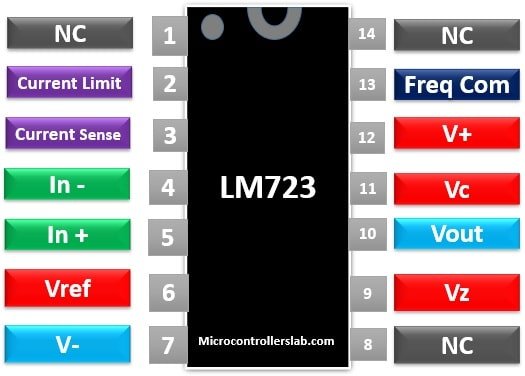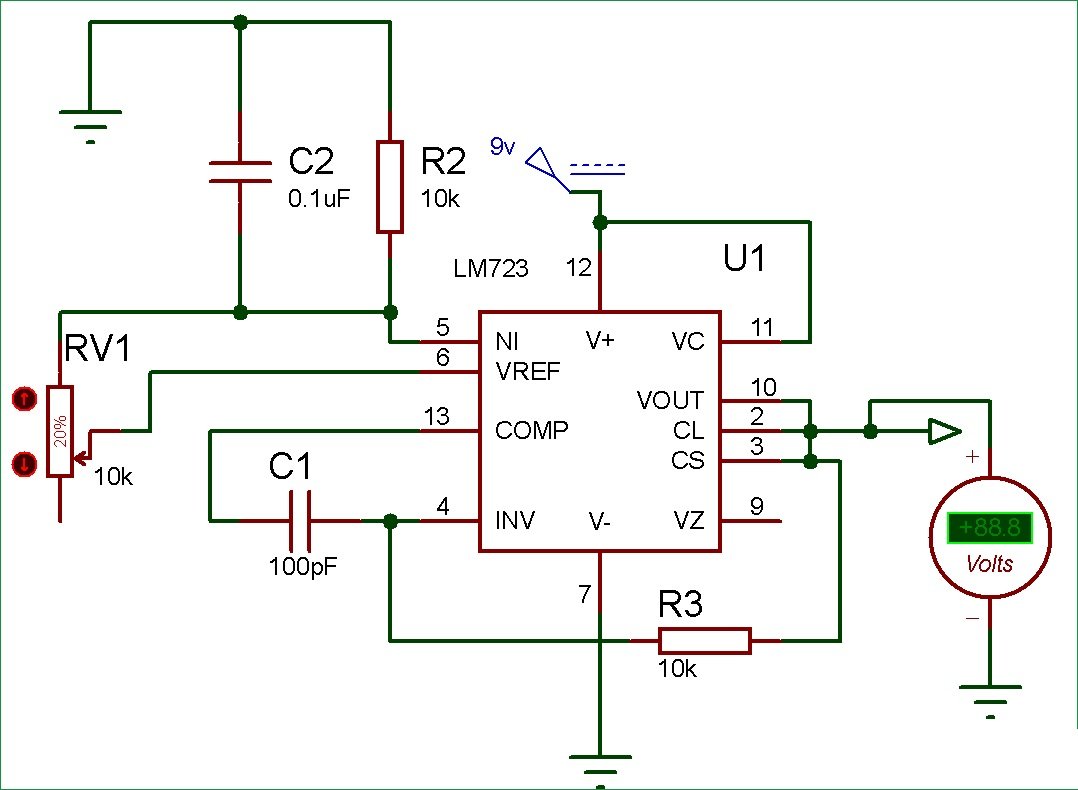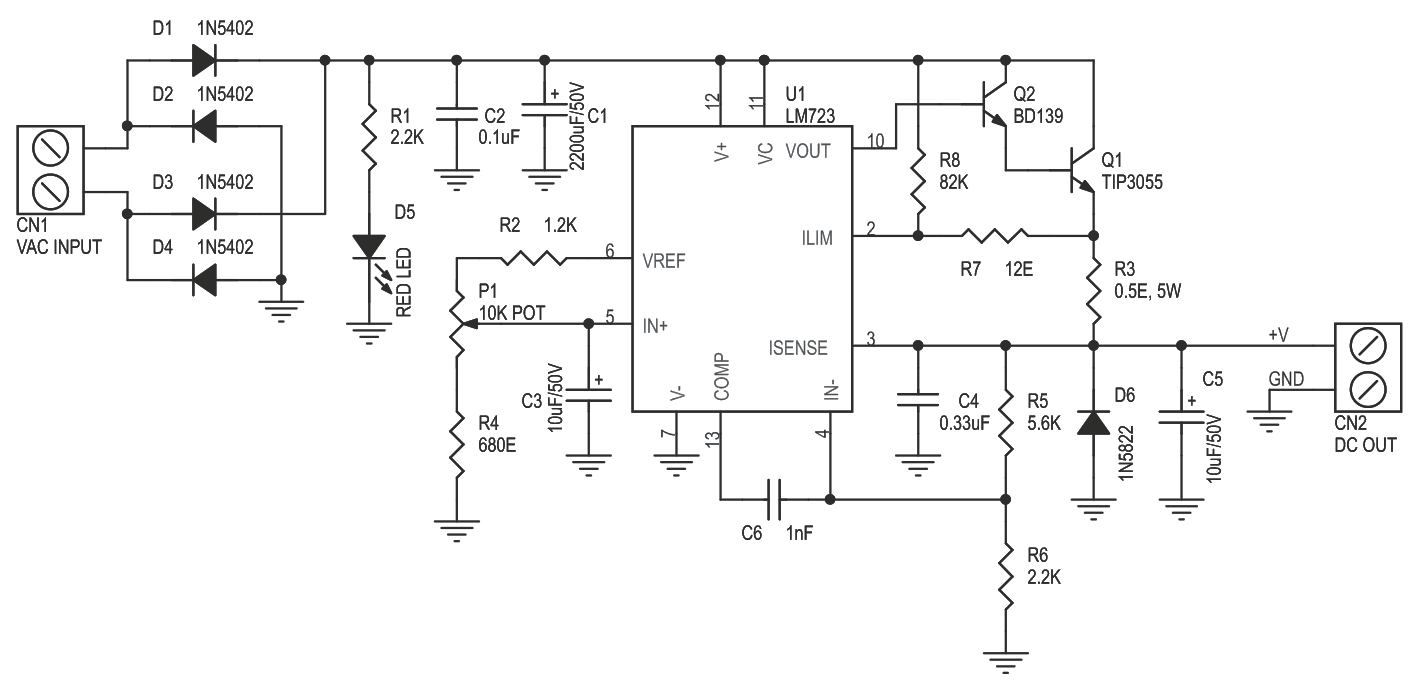Voltage regulators are used to getting a stable fixed output voltage. LM723 IC is also a voltage regulator but it can generate a variable voltage which can be adjusted in a range of 3V to 37V. It is basically used in the series regulator application. Although it offers a 150mA output current. But we can get an excessive current of up to 10A for driving the load by connecting a bypass transistor externally. The maximum input voltage supply is 40V.
LM723 Pin Configuration Diagram
It is available in three packages such as 14-pin DIP, 10-pin TO-100, and NAJ0020A package. But the pin layout is the same for all packages. This picture shows a pinout diagram with brief details of each pin.
Voltage Regulator Pin Description
Pin# 01, 08, 13, 14: NC
These pins are not connected to the circuit are left floating. They don’t have any function but may have an unexposed internal function.
Pin#02: CURRENT LIMIT
The internal structure of this IC consists of a transistor that is used to keep the current in limits in order to minimize power dissipation and heat losses. Pin 2 is connected to the base of the transistor internally. Therefore, pin 2 is used for limiting the current.
Pin#03: CURRENT SENSE
It is the input pin connected to the emitter of the current limiting transistor.
Pin#04: INVERTING INPUT
LM723 consists of an error amplifier. Pin 4 is the inverting input of this amplifier. It is used for obtaining constant voltage at the output by providing output voltage as a feed back to this pin.
Pin#05: NON-INVERTING INPUT
It is an input pin connected internally to the non-inverting terminal of the error amplifier. A reference voltage is applied at this pin.
Pin#06: Vref
It is the output of the voltage reference amplifier integrated inside the IC. It provides an output voltage of approximately 7V.
Pin#07: V-
Connect this pin with a ground of the circuit.
Pin#09: Vz
This pin is used in designing negative voltage regulators. It is connected to the anode terminal of the Zener diode.
Pin#10: Vout
It gives the regulated output voltage in a range of 2V to 37V.
Pin#11: Vc
It is connected to voltage supply when it is not connected to a series pass transistor. Otherwise, it is connected to the collector of the series pass transistor.
Pin#12: V+
A positive power supply is applied at this pin. We can connect maximum of 40 volts input to this pin.
Pin#13: FREQUENCY COMPENSATION
This pin is used to reduce noise in a circuit by connecting a capacitor of 100pf with it. Internally, it is the output pin of the error amplifier.
LM723 Voltage Regulator Features
The important features of this IC are:
- It is an adjustable voltage regulator which operates in both positive or negative supply operation.
- Voltage can be adjusted from 2V to 37V.
- The maximum input voltage is 40V.
- Output current is 150mA without an external pass transistor. It can be increased to 10A by adding transistors externally.
- It has a low standby current gain, very low-temperature drift, and high ripple rejection.
- The load and line regulation is 0.03% and 01%.
- It has a built-in fold back current limiting.
- Its performance is ensured over -55 °C to +125 °C.
Where to use it?
Due to its small size and lower cost, it is used in a wide variety of applications. It can be used as a series, shunt, linear, switching and floating regulators. Its wide voltage range, low noise, and extreme flexibility make it highly suitable for use in series voltage regulation applications.
LM723 Working Principle
An input voltage is applied to the PIN12 of LM723 to get a constant and regulated output voltage at Pin6. This voltage is then fed back by connecting a resistor and a capacitor to the non-inverting pin of the IC. The two voltages at the inverting and non-inverting pin are compared. If the voltage at pin5 is greater than pin4 then the current will flow from the collector to emitter of a series pass transistor and we can get the output voltage.
Simple Application Circuit
To adjust the output voltage value, you can replace R1 with a potentiometer. By varying the resistance of that potentiometer, you can achieve the desired output. But the only issue with this circuit is low output current that is 150mA.
LM723 Example Circuits
In this section, we provide some practical examples using this variable voltage regulator.
Low Voltage Power Supply Example LM723
This circuit can provide an only low voltage ( between 2-7 volts) and low output current ( 150mA). However, we can increase the current limit up to 10 Ampere by using external transistors. This circuit gives output voltage according to this formula:
Vout = Vref * (R2 / RV1+R2)
- Connect 9 volts dc to reference amplifier V+ pin and also to Vc pin. It will provide a constant voltage at the Vref pin.
- After that, we connect the Vref voltage to the noninverting pin through the variable resistor and capacitor circuit.
- LM723 compares the voltage of the non-inverting pin with a voltage of inverting pin and provides output voltage/current according to the above formula.
2.6-24 Volts Variable Voltage Power Supply
This example circuit provides variable output in the range of 2.6-24V. It can provide 1 Ampere output load current. We use a 14-pin DIP package.
- Connect 30 volts AC to VAC input terminal.
- After that 1N5402 diodes based full bridge rectifier converts ac voltage into dc.
- RED LED shows the status of the input signal and serves the purpose of the input voltage indicator.
- Capacitors C1 and C2 removes ripples from dc voltage and provides smooth dc voltage to LM723.
- A variable resistor of 10k ( shown with the name of 10k POT) is used to adjust output voltage.
- We connect TIP3055 NPN transistor as an external bypass resistor to increase output current handling capability.
We can calculate output voltage according to this formula:
Vout = Vref * (R2 / RV1+R2)
LM723 Applications
- Basic high and low voltage regulators can be designed by connecting appropriate external components with this IC.
- Linear, switching and floating regulators
- Series and shunt regulators.





